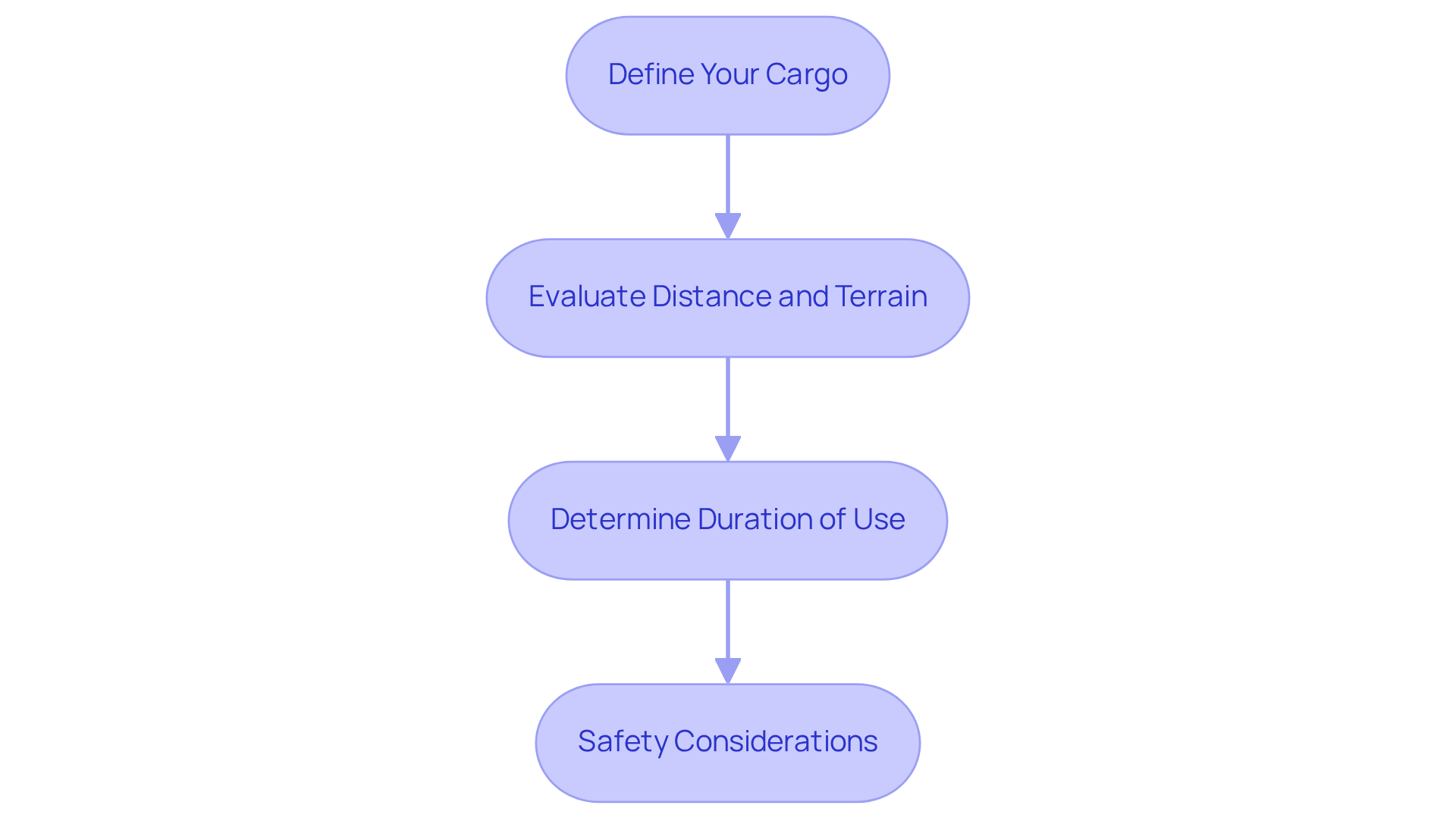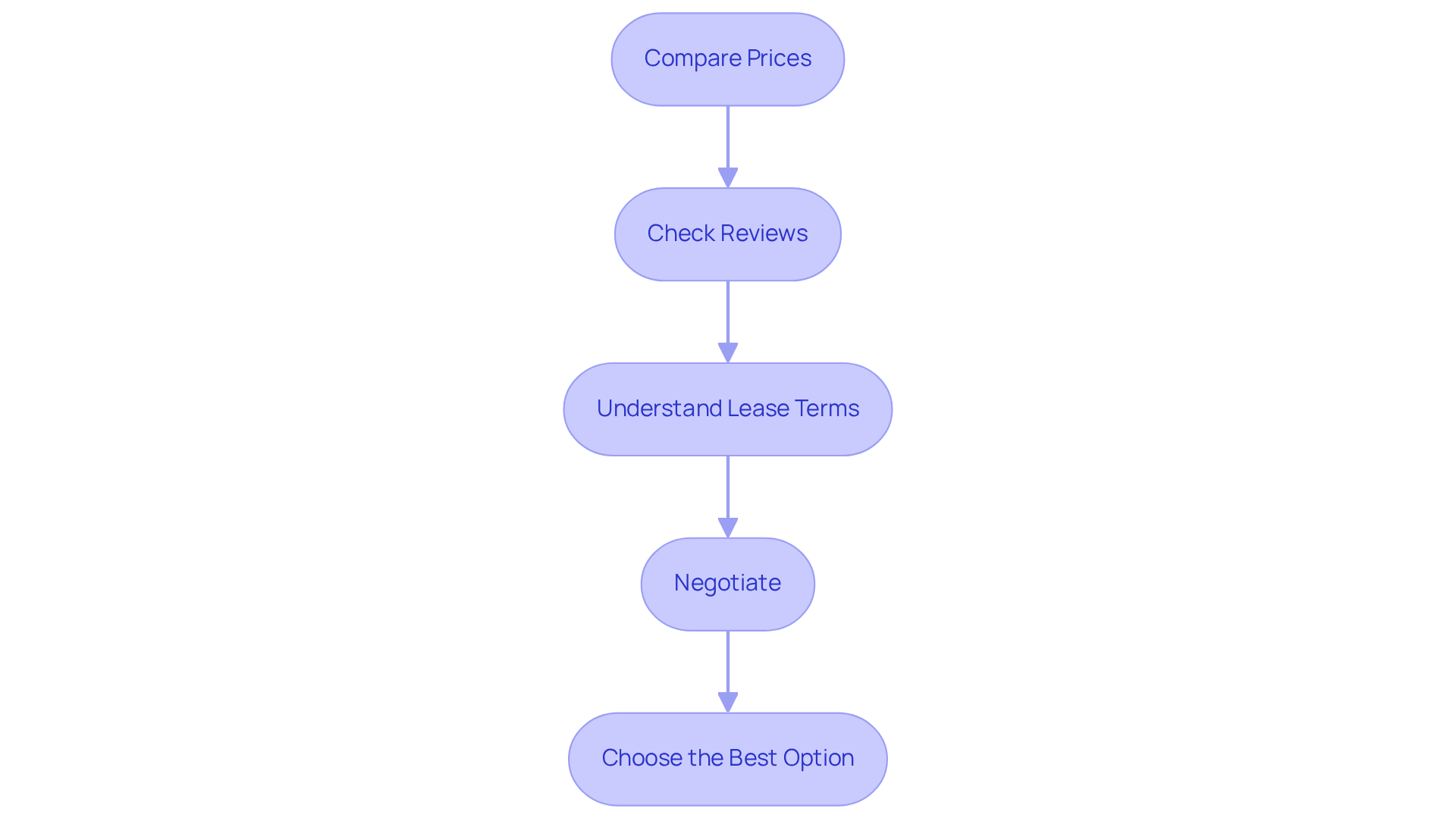Overview
Successful cargo trailer rental hinges on key practices that ensure optimal performance. First and foremost, it is essential to select the right size and weight capacity for your needs. Additionally, choosing the appropriate type of trailer can significantly enhance your rental experience. Clear communication with the leasing company is paramount; this not only fosters a better understanding but also mitigates potential misunderstandings.
To support these practices, specific criteria must be considered:
- Measuring cargo dimensions accurately is crucial, as it ensures that your chosen trailer can accommodate your load.
- Verifying towing compatibility is a vital step that cannot be overlooked.
- Emphasizing the importance of documenting agreements will help avoid misunderstandings and pave the way for a smooth rental experience, ultimately leading to greater satisfaction with your choice.
In conclusion, adhering to these key practices will not only facilitate a successful rental but also enhance the overall experience. By paying attention to size, type, and communication, you position yourself for reliable and efficient cargo transport. Take action today to ensure your next cargo trailer rental meets all your expectations.
Key Highlights:
- Size is crucial; measure cargo to ensure it fits within the trailer.
- Cheque the weight capacity of the trailer to avoid overloading.
- Choose between enclosed or open trailers based on cargo protection needs.
- Verify towing compatibility with your vehicle's capacity and hitch requirements.
- Look for additional features like ramps and tie-down points for enhanced usability.
- Define the type and quantity of cargo to guide trailer selection.
- Evaluate distance and terrain to determine the necessary trailer durability.
- Consider the duration of use to decide between renting and purchasing a trailer.
- Ensure safety compliance by checking brakes, lights, and secure tie-downs.
- Compare rental prices and be aware of hidden fees that may affect the budget.
- Cheque customer reviews for insights on service quality and reliability.
- Understand lease terms, including insurance coverage and mileage limits.
- Negotiate lease terms, especially for long-term rentals, to secure discounts.
- Establish clear communication with leasing companies to avoid misunderstandings.
- Document all communications and agreements to ensure transparency.
- Schedule pick-up and return times carefully to avoid extra charges.
- Conduct a pre-rental inspection to document any existing damage.
Introduction
Navigating the world of cargo trailer rentals can be daunting. With a myriad of options available and the specific requirements each project demands, understanding the key practices for successful rentals is essential. This knowledge not only streamlines the process but also ensures that transportation needs are met efficiently and safely.
Critical factors to consider when selecting a cargo trailer include:
- Size
- Weight capacity
- Rental terms
Project managers can maximize their rental experience while minimizing costs by focusing on these aspects. This article delves into essential strategies that will empower readers to make informed decisions, ultimately leading to successful and hassle-free cargo trailer rentals.
Identify Key Selection Criteria for Cargo Trailers
When selecting a cargo trailers rent option, it is essential to consider several key criteria that will ensure your choice meets your transportation needs effectively.
- Size: First, determine the dimensions required based on the cargo you plan to transport. Measuring your items is crucial to ensure they fit comfortably within the vehicle, preventing any potential issues during transit.
- Weight Capacity: Next, check the vehicle's weight limit. This is vital to avoid overloading, which can lead to safety hazards and possible damage to both the trailer and your cargo.
- Type of Transport: Additionally, choose between enclosed or open models based on the nature of your cargo when you look into cargo trailers rent. Enclosed vehicles provide enhanced protection from the elements, making them ideal for sensitive items.
- Towing Compatibility: Furthermore, ensure that your vehicle can safely tow the load by verifying its towing capacity and the hitch requirements of the trailer. This step is crucial for safe and efficient transportation.
- Features: Finally, look for additional features such as ramps, tie-down points, and ventilation. These elements can significantly enhance usability and safety, making your transportation experience smoother and more efficient.
Assess Project Requirements and Trailer Specifications
To effectively assess your project requirements for cargo trailer rentals, it is essential to follow these key steps:
-
Define Your Cargo: Begin by clearly identifying the type and quantity of items you will be transporting. This foundational step will guide your choice of the suitable vehicle size and type, ensuring it meets your specific needs.
-
Evaluate Distance and Terrain: Next, analyze the distance you will be traveling and the terrain you will encounter. For example, a more durable vehicle may be necessary for rough or uneven surfaces, while a standard vehicle suffices for smoother routes.
-
Determine Duration of Use: Assess how long you will need the vehicle. Short-term projects often benefit from cargo trailers rent, which provides flexibility and cost-effectiveness, while long-term needs might justify investing in a purchase.
-
Safety Considerations: Finally, ensure that the vehicle complies with safety standards and is equipped with essential features such as brakes, lights, and secure tie-downs. This not only safeguards your goods but also enhances overall safety during transport.
By adhering to these guidelines, project managers can make informed choices that align with their specific project needs, ultimately leading to successful vehicle leasing.

Evaluate Rental Options and Cost-Effectiveness
When evaluating options for cargo trailers rent, adopting a comprehensive approach is essential. Begin by comparing prices: conduct thorough research across various leasing companies to assess their pricing structures and services. Be vigilant for hidden fees that could influence the overall cost, as these can significantly affect your budget.
Next, check reviews. Customer feedback is invaluable; examining reviews can offer perspectives on the dependability and quality of service provided by various leasing firms, assisting you in making an informed choice. Understanding lease terms is also crucial. Familiarize yourself with the specific terms and conditions of the lease agreement. Pay attention to details such as insurance coverage, mileage limits, and return policies, as these factors can influence your overall experience and costs.
Furthermore, don’t hesitate to negotiate. Discuss lease terms, especially for prolonged leasing durations, as many companies are open to offering discounts, which can lead to significant savings. By adhering to these practices, project managers can ensure they choose the most economical and dependable cargo trailers rent options available in the Dallas-Fort Worth region.

Implement Effective Rental Processes and Communication Strategies
To implement effective rental processes, consider the following guidelines:
- Establish Clear Communication: Maintaining open lines of communication with the leasing company is crucial. Confirm all details regarding the leasing contract and any specific requirements. Effective communication reduces misunderstandings; properties with strong tenant relationships attract more renters. In fact, 85% of tenants emphasize the necessity for effective communication, underscoring its significance in the leasing process.
- Document Everything: It is essential to maintain comprehensive records of all communications, agreements, and transactions associated with the lease. This practice is vital, as properties with active tenant loyalty programs experience a 27% rise in positive feedback. This highlights the importance of transparency in lease agreements. Documenting communications can also aid in resolving disputes if they arise.
- Schedule Pick-Up and Return: Careful planning of pick-up and return times is necessary to avoid additional charges. Verify these times with the leasing firm to ensure alignment and prevent unexpected charges, which can occur due to miscommunication.
- Conduct a Pre-Rental Inspection: Before taking the trailer, inspect it for any existing damage and ensure it meets your requirements. Document any issues to avoid being charged for them later. Properties with regular maintenance inspections experience a 15% higher retention rate, emphasizing the importance of proactive measures in lease agreements.
By following these practices, you enhance your rental experience and minimize disputes, ensuring a smoother process in your construction projects. Additionally, companies like EZ Equipment Rental exemplify these practices through their commitment to customer satisfaction and quality service.
Conclusion
Successful cargo trailer rentals hinge on a clear understanding of essential practices that enhance the rental experience. By focusing on key selection criteria such as size, weight capacity, and towing compatibility, project managers can ensure that their chosen trailer aligns perfectly with their transportation needs. This foundational knowledge not only streamlines the rental process but also safeguards against potential issues during transit.
Throughout this article, critical insights have been shared, including the importance of:
- Assessing project requirements
- Evaluating rental options for cost-effectiveness
- Implementing effective communication strategies
By defining cargo specifics, analyzing terrain, and maintaining open lines of communication with leasing companies, renters can significantly improve their overall experience. Additionally, documenting agreements and conducting pre-rental inspections serve as proactive measures that mitigate disputes and enhance satisfaction.
Ultimately, understanding and applying these best practices not only leads to successful cargo trailer rentals but also promotes a more efficient and cost-effective approach to project management. Embracing these strategies empowers individuals to navigate the rental landscape with confidence, ensuring that their transportation needs are met with precision and reliability.
Frequently Asked Questions
What should I consider when selecting a cargo trailer for rent?
When selecting a cargo trailer, consider the size, weight capacity, type of transport (enclosed or open), towing compatibility, and additional features.
How do I determine the right size for a cargo trailer?
Determine the dimensions required by measuring your items to ensure they fit comfortably within the trailer.
Why is it important to check the weight capacity of a cargo trailer?
Checking the weight capacity is vital to avoid overloading, which can lead to safety hazards and potential damage to the trailer and cargo.
What is the difference between enclosed and open cargo trailers?
Enclosed trailers provide enhanced protection from the elements, making them suitable for sensitive items, while open trailers may be more appropriate for larger, less delicate cargo.
How can I ensure my vehicle can safely tow the cargo trailer?
Verify your vehicle's towing capacity and the hitch requirements of the trailer to ensure safe and efficient transportation.
What additional features should I look for in a cargo trailer?
Look for features such as ramps, tie-down points, and ventilation, as these can enhance usability and safety during transportation.




